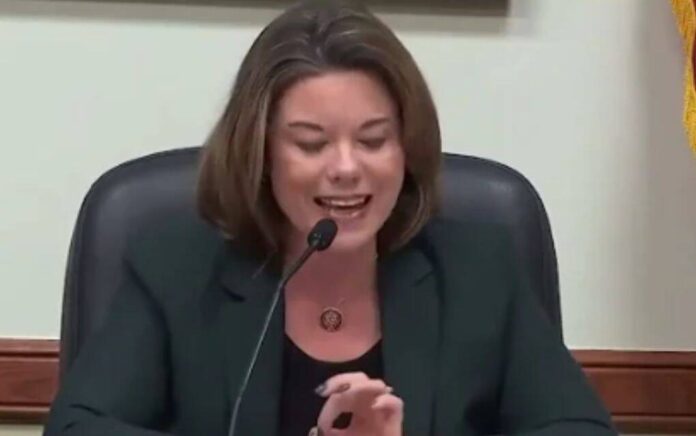
The Democrat Party’s had a rough go. The Party’s future is now in question.
That’s why Rogue Democrats have confessed that the Party is done for in this bombshell announcement.
Democrats Form New Group to Counter Electoral Decline
A coalition of younger Democratic leaders has launched an initiative called Majority Democrats to steer the party away from becoming a “permanent minority” in national politics, according to a report from The New York Times. The group aims to reshape the Democratic Party’s strategy following recent electoral setbacks.
Majority Democrats is focused on recruiting fresh candidates and crafting messages to improve the party’s public image and regain voter support, the Times reported. The effort comes as the party grapples with disappointing results in recent elections and seeks to rebuild its standing ahead of future contests.
Rep. Angie Craig of Minnesota, a key figure in the initiative, emphasized the need for a approach to win elections. “If we don’t create a party that appeals to a wide range of voters, we risk being sidelined in national elections,” Craig told the Times. She is currently running for a competitive Senate seat in Minnesota’s 2026 midterms, where she trails Lt. Gov. Peggy Flanagan by a significant margin, according to a February Public Policy Polling survey.
Craig cautioned that focusing solely on opposing former President Donald Trump may yield short-term gains but won’t secure lasting majorities. “We need to clearly articulate what our party stands for,” she said, advocating for a positive vision to attract voters.
The group comprises about 30 Democratic leaders from various government levels, united by a commitment to broaden the party’s appeal. Rohan Patel, a former Tesla executive and Obama administration official, serves as the executive director, while the communications team includes strategists like Lis Smith, Eric Koch, Andrew Mamo, and Jackie Rosa, the Times noted.
Texas State Rep. James Talarico, a potential U.S. Senate candidate and member of the group, stressed the importance of inclusivity. “We need to embody the open-minded values we preach and build coalitions with those who may not fully align with our policies,” Talarico told the Times. He is set to appear on “The Joe Rogan Experience” to discuss his vision.
As the 2026 midterms and 2028 presidential election approach, Democrats are working to redefine their brand. Recent polls indicate widespread disapproval of the party’s leadership, prompting calls for a shift away from divisive identity politics that some believe alienated voters in 2024.
Nevada State Rep. Sandra Jauregui highlighted the party’s missteps, particularly its heavy focus on issues like abortion rights, which she said failed to resonate with Hispanic and Asian American voters in her district. “Voters have been clear about their priorities, but we haven’t listened well,” Jauregui told the Times.
Democrats’ Fall from Favor in Polls
The Democratic Party’s standing has plummeted to historic lows following its 2024 election losses, with multiple polls revealing deep voter dissatisfaction and internal divisions. Surveys conducted in early 2025 paint a grim picture of a party struggling to connect with its base and the overall electorate, raising questions about its strategy and leadership.
An NBC News poll from March 7-11, 2025, found that only 27% of registered voters view the Democratic Party favorably, marking its lowest rating in NBC’s polling history since 1990. A CNN poll from the same period reported a similarly dismal 29% favorability, a record low since 1992. These figures reflect a sharp decline in public support, driven in part by frustration among Democratic voters themselves, with 20% expressing negative views of their own party in the NBC survey.
The party’s troubles stem from its failure to articulate a compelling vision, compounded by internal rifts over how to respond to President Donald Trump’s agenda. A CNN poll revealed that 57% of Democrats and Democratic-leaning independents want party leaders to prioritize blocking Republican policies, while only 42% favor compromise. This marks a shift from 2017, when 74% of Democrats supported working with Republicans. The decision by Senate Minority Leader Chuck Schumer to back a GOP-led spending bill in March 2025 sparked fierce backlash, with some calling for his resignation.
Gallup’s April 2025 poll shows the erosion of confidence in Democratic congressional leadership, with only 25% of respondents expressing trust, down from a previous low of 34% in 2023. This figure is significantly below the historical average of 45% since 2001. Similarly, a Quinnipiac poll from February showed only 40% of Democrats approving of their congressional leaders, with 49% disapproving—a historic low. These numbers suggest a party disconnected from its base, with voters frustrated by a perceived lack of resolve.
The Democrats’ 2024 election losses exposed vulnerabilities in their coalition. Trump’s gains among young voters, Black, and Hispanic communities—groups traditionally aligned with Democrats—highlighted the party’s failure to address key concerns. A New York Times report noted that these groups shifted rightward, contributing to Trump’s popular vote victory, a rare feat for a Republican since 1988. The party’s focus on issues like abortion rights, while resonant for some, alienated others, particularly in diverse districts.
Democratic strategists have criticized the party’s messaging as ineffective and out of touch. Charlotte Clymer, a Democratic operative, told Newsweek that the party lacks a clear vision and struggles with “abysmal” messaging. This sentiment is echoed by voters, with a CBS News/YouGov poll from June 2025 finding that 71% of voters, including 78% of Americans overall, believe Democrats have been ineffective in opposing Trump. Only 33% feel the party fights for people like them.
The party’s leadership vacuum exacerbates its challenges. A CNN poll found no clear consensus on who represents the party’s core values, with figures like Rep. Alexandria Ocasio-Cortez (10%), Kamala Harris (9%), and Bernie Sanders (8%) receiving modest support. Over 30% of respondents couldn’t name a leader, with one stating, “No one. That’s the problem.” This lack of a unifying figure hinders the party’s ability to rally its base.
Polls also highlight the Democrats’ struggles with key demographics. The Harvard Youth Poll from April 2025 showed that only 31% of young Americans approve of Democrats in Congress, with many feeling disconnected from institutions. The party’s favorability among independents is particularly weak, with NBC reporting just 11% viewing the party positively, compared to 56% with negative views. This erosion of support among independents and young voters bodes poorly for the 2026 midterms.
Despite some signs of recovery, such as Democratic wins in special elections in South Carolina and Iowa, the party’s unpopularity persists. A RealClearPolitics average from March to May 2025 showed a net negative favorability of -23.6 points, with 34.7% favorable and 58.3% unfavorable ratings. These figures indicate that isolated victories have not translated into widespread support, as voters remain skeptical of the party’s direction.
The Democrats’ focus on identity politics and progressive priorities has drawn criticism for alienating working-class and minority voters. A Newsweek article suggested that the party’s assumption of an enduring coalition of non-white voters was shattered in 2024, as Trump made significant inroads with these groups.
The party’s inability to adapt its messaging to economic concerns, where Republicans now lead by 7-12 points according to Reuters/Ipsos, further undermines its appeal. Internal divisions over strategy—whether to adopt a more confrontational stance or seek bipartisan cooperation—continue to paralyze the party. A Quantus poll from April 2025 showed 49% of voters favoring opposition to Trump, while 41% supported collaboration.



















